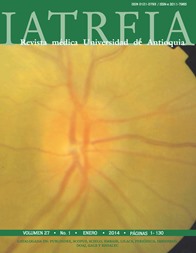Arginine and cancer: Implications in the regulation of antitumoral response
DOI:
https://doi.org/10.17533/udea.iatreia.14293Keywords:
Antitumoral Response, Arginase, Arginine, Lymphocytes T, Nitric Oxide SynthaseAbstract
Recent findings support the potential role of arginine as a regulator of the immune response. Correlation between decreased arginine and decreased proliferation and activation of T lymphocytes has been described in liver transplantation, severe trauma, sepsis and cancer. Among the effects, decrease in the CD3z chain expression (activation signal in the T cell) has been described. Arginine is reduced in relation to the production of arginase 1 (ARG1) by myeloid suppressor cells. Two possible mechanisms have been postulated by which the increased activity of ARG1 could be acting on a tumor. The first is the reduction of lymphocyte proliferation and cell cycle arrest. The second is to promote tumor growth by transforming arginine in precursors of polyamines. We present in this article the main concepts on the role of arginine in antitumor response.
Downloads
Downloads
Published
How to Cite
Issue
Section
License
Papers published in the journal are available for use under the Creative Commons license, specifically Attribution-NonCommercial-ShareAlike 4.0 International.
The papers must be unpublished and sent exclusively to the Journal Iatreia; the author uploading the contribution is required to submit two fully completed formats: article submission and authorship responsibility.














